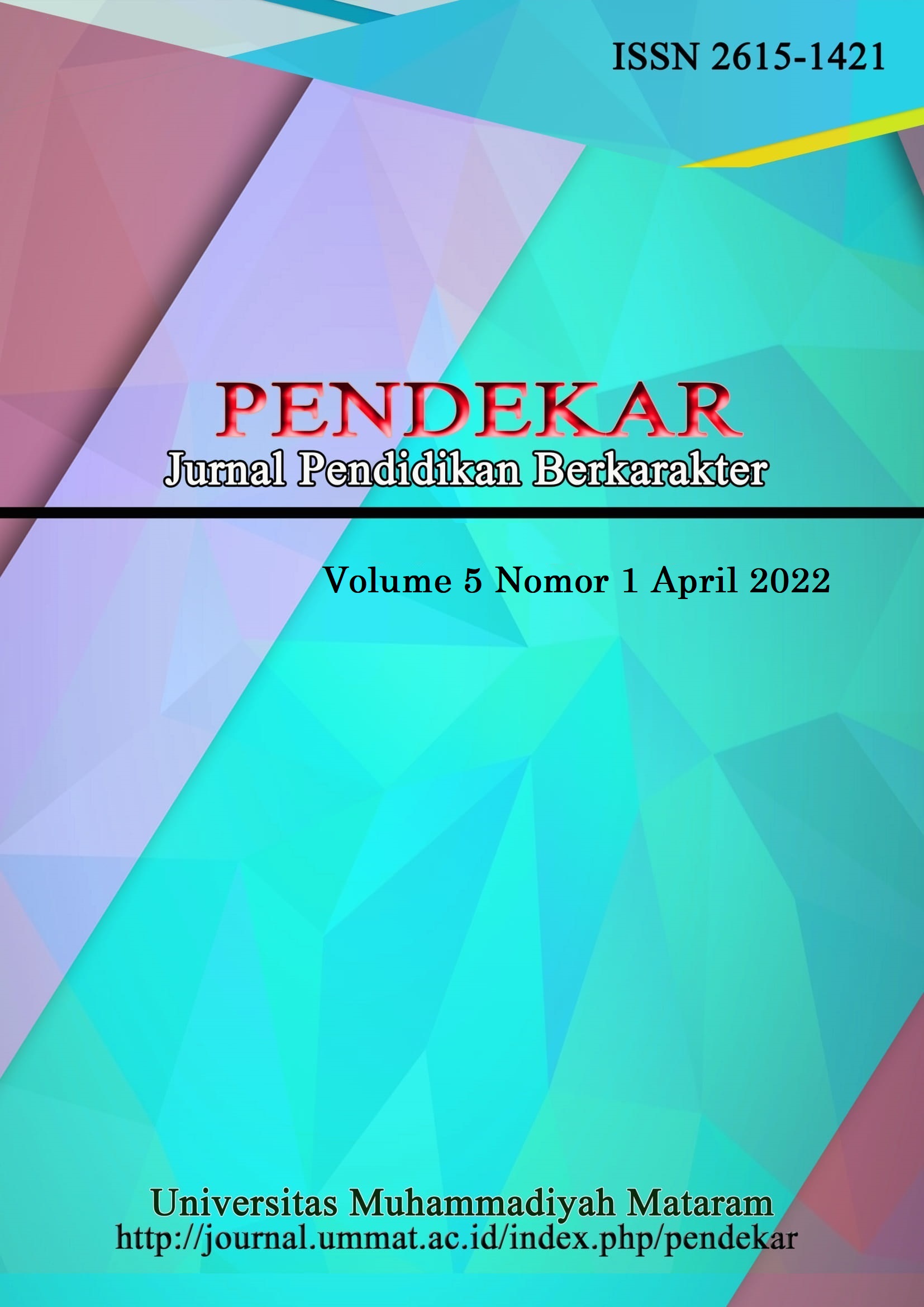RESILIENSI MANAJEMAN KURIKULUM PESANTREN HIAYATULLAH TERHADAP RADIKALISME (STUDI KASUS DI PESANTREN HIDAYATULLAH MATARAM)
DOI:
https://doi.org/10.31764/pendekar.v5i1.7784Keywords:
Resiliensi, Manajemen Kurikulum Pesantren, Radikalisme.Abstract
Abstrak: Artikel ini untuk mengkaji ketahanan dalam menangkal maraknya radikalisme yang diekspresikan melalui pondok pesatren hidayatullah sebagaiwadah dakwah islamiyah , dan tarbiyahserta melalui artikel ini kami akan coba memberikan penjelasan yang berbeda terhadap tuduhan yang selama ini tertuju pada pondok pesantren yang nota benenya sebagai salah satu media dakwah yang disiukan sebagai tempat penyebaran paham radilakalisme yang berujung pada tindakan terorisme.
Abstract: Â This article is to examine resilience in countering the rise of radicalism expressed through the Hidayatullah Islamic boarding school as a container for Islamic Da'wah, and Tarbiyah. Through this article, we will try to provide a different explanation for the accusations that have been aimed at Islamic boarding schools where the name of Benya is one of the Da'wah media. What is designated as a place for the spread of radicalism that leads to acts of terrorism.References
Alfanani, T. S. (2017). Konstruksi Sosial Komunitas Pesantren mengenai Isu Radikalisme (Studi Kasus Pada Pesantren Salaf & Modern di Kota Malang). Jurnal Sosiologi Agama, 10(2), 1–24.
BNPT. (2019). 19 Pesantren Terindikasi Ajarkan Radikalisme. https://www.cnnindonesia.com/nasional/20160203201841-20-108711/bnpt-19-pesantren- terindikasi-ajarkan-radikalisme
Djati, S. G. (n.d.). Metodologi Penelitian Agama.
Esposito, J. L., atau Realitas, A. I. M., & Revisi, E. (1996). Menggugat Tesis Huntington. Bandung: Mizan.
Ismail, N. H. (2014). The anti-terrorism expert tells Jo Baker about attending school with a future Bali bomber and helping jihadists to reform. https://www.scmp.com/magazines/post-magazine/article/1578415/my-life-noor-huda-ismail
Malik, A. (2017). Genealogi radikalisme dalam pesantren (Studi Fenomenologi Pada Pesantren Al Maida Di Bima).
Moesa, A. M. (2007). Nasionalisme Kiai; Konstruksi Sosial Berbasis Agama. LKIS PELANGI AKSARA.
Moleong, Lexy J. (2010). Edisi: cet. 20 metode penelitian kualitatif. Bandung: Remaja Rosdakarya.
Moleong, Lixy J. (2016). Metodologi Penelitian Kualitatif. Bandung: Rosda.
Nurcholish, A. (2015). Peace Education & Pendidikan Perdamaian Gus Dur. Elex Media Komputindo.
Permana, U., & Sos, S. (2021). Pendidikan Kewarganegaraan. LovRinz Publishing.
Saddam, S., Mubin, I., & SW, D. E. M. (2020). PERBANDINGAN SISTEM SOSIAL BUDAYA INDONESIA DARI MASYARAKAT MAJEMUK KE MASYARAKAT MULTIKULTURAL. Historis: Jurnal Kajian, Penelitian Dan Pengembangan Pendidikan Sejarah, 5(2), 136–145.
Saleh, K., & Arbain, M. (2019). Deradikalisasi Di Perguruan Tinggi: Strategi Menangkal Radikalisme Melalui Pendidikan Islam. Ar-Ruzz Media.
Saputra, W. (n.d.). Dakwah Dan Pluralisme: Studi Pemikiran KH Abdurrahman Wahid.
Society, T. R. (2014). The Royal Society.
Sugiyono. (2013). Metode Penelitian Pendidikan Pendekatan Kuantitatif, Kualitatif, dan R dan D. Alfabeta.
Sugiyono, H. (2016). Metode kualitatif dan kuantitatif. Cetakan Ke-23. Alfabeta, Bandung.
Syam, N. (2010). Radikalisme dan Masa Depan Hubungan Agama-agama: Rekonstruksi Tafsir Sosial Agama.
Usman, S., Qodir, Z., & Hasse, J. (2014). Radikalisme agama di Indonesia. Yogyakarta: Pustaka Pelajar.
Widyaningsih, R. (2019). Deteksi Dini Radikalisme. Purwokerto: Lembaga Penelitian Dan Pengabdian Kepada Masyarakat Universitas Jenderal Soedirman.
Writingexplained.org. (n.d.). Resilience vs. Resiliency – What’s the Difference? https://writingexplained.org/resilience-vs-resiliency-difference
Downloads
Published
Issue
Section
License
Authors who publish articles in International Journal on Student Research in Education, Science, and Technology agree to the following terms:
- Authors retain copyright of the article and grant the journal right of first publication with the work simultaneously licensed under a CC-BY-SA or The Creative Commons Attribution–ShareAlike License.
- Authors are able to enter into separate, additional contractual arrangements for the non-exclusive distribution of the journal's published version of the work (e.g., post it to an institutional repository or publish it in a book), with an acknowledgment of its initial publication in this journal.
- Authors are permitted and encouraged to post their work online (e.g., in institutional repositories or on their website) prior to and during the submission process, as it can lead to productive exchanges, as well as earlier and greater citation of published work (See The Effect of Open Access).

